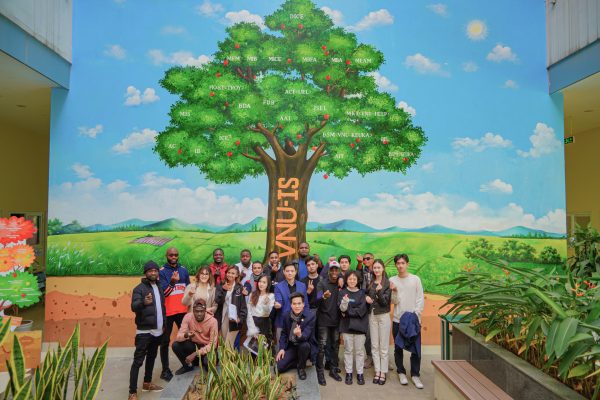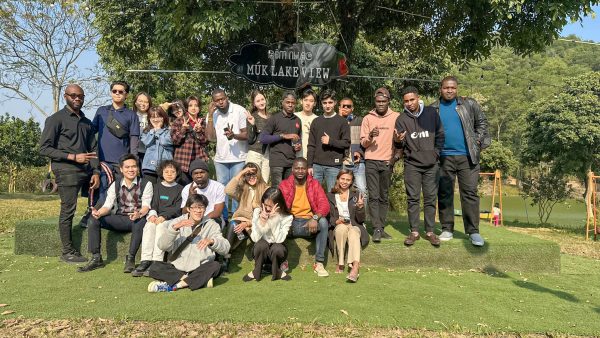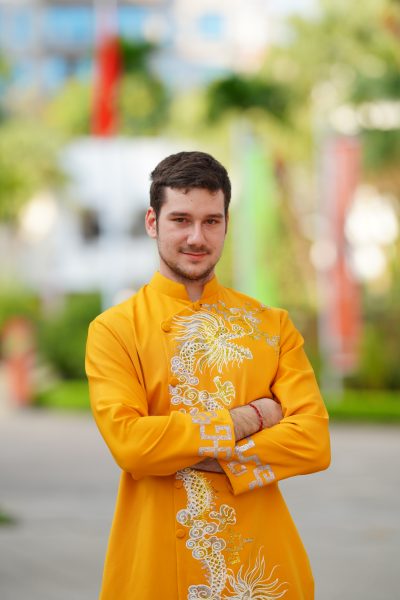Vietnam is also known as ‘Socialist Republic of Vietnam’ and its capital is Hanoi. Historically, Vietnam has encountered domination of the specific civilization adapting their culture, ideas, institutions, and technology as per their own growth. They have the most rapidly expanding economy in the world with a growing population. The country has a blend of modern cities like Hanoi and Ho Chi Minh and cultural envision. It is among the 3rd largest oil producer in Southeast Asia. The Vietnamese have placed an importance on education through ‘Three Teachings’ of Confucianism, Taoism, and Buddhism for holistic development of a child and social being.
According to the Ministry of Education and Training, international students studying in Vietnam are mainly at university level and short-term courses, most of them are international students outside the Agreement. Determining the attraction to this target group of learners will improve the quantity and quality of international admission, as well as international training programs.
Why study in Vietnam?
The tertiary education system in Vietnam has been embarked on a major transformation which leads the system to a knowledge-based economy. There are numerous networking opportunities that are expanding with the growing number of expert faculties. In Vietnam, the literacy rate is high and an emphasis on training in the scientific field, technology, and the introductory of market reforms on economics and business creating diverse global opportunities for the international enthusiast. It comprises a rigorous curriculum and a fruitful competent environment for the international enthusiasts with the English medium courses.
In the globalization era, Vietnam is boosting its economic and educational growth in fast pacing leading landscape with renowned universities. Vietnam follows an International education system that opens numerous opportunities to make a career in many countries around the world. According to the Times Higher Education (THE) World University Rankings, Vietnamese’s 6 universities have been placed in the best global college list. Among them, Vietnam National University, Ho Chi Minh City Open University, Ton Duc Thang University, Duy Tan University, and Phenikaa University.
Apart from the mentioned high ranked Vietnamese Universities, plenty of wonderful institutions are also available for international students in an affordable feature of the study. They comprise both public and private universities; three kinds of universities like, research-based universities, application-based and experiment-based universities. Some of the universities like—the Can Tho University, Foreign Trade University, University of Da Nang, University of Economics, National Economics University, and Hanoi National University of Education are promoting higher education system in a long run.
What are the best courses to study in Vietnam for international students?
Many premium universities are establishing their satellite campuses in the leading economy and newest destination of Vietnam to attract more international students. Some of the popular courses such as International Business Management, Software Engineering, Computing, Information & Communication Technology, International Finance, Banking, Logistic and Economic are some of the self-evolving programs.
An international student can study, stay or travel in Vietnam in an affordable manner. It has a student-friendly environment that makes it a dream destination for international students.
Vietnamese culture is enriched with an ambiguity of cultural, traditional, and modern persona of the ethnic groups of the individuals.
Why do more than 45,000 international students choose Vietnam to study abroad?
According to a report by the Department of International Cooperation (MOET), during the period 2016-2021, Vietnam has 155 educational institutions receiving and training more than 45,000 foreign students from 102 countries and territories.
To attract international students, educational institutions must think about two factors: competitive tuition and university rankings. International students who do not study abroad under a scholarship/agreement or short-term exchange but self-funding will really pay attention to the quality of training and employment opportunities after graduation.
Prof.DsC. Nguyen Dinh Duc, Former Head of the Training Department of Vietnam National University – an educational institution with international students from 74 countries, affirmed that “the higher the university ranking is, the more credit the degree is.”

In addition to the school’s overall ranking, students are also interested in the rankings of fields and majors. Vietnam National University has three ranked field groups: Engineering & Technology ranked 386, Natural Sciences ranked 401-450 and Social Science & Management ranked 451-500.
The International School is an “International Hub” of Vietnam National University that receives and trains international students. Notably, 100% of the School’s international students are not subject to studying abroad under the Agreement, they are all self-funded for their study in technology, engineering, management, administration, finance, accounting and other fields taught entirely in English. From 2015 to present, the International School has been a pioneer in implementing training models with a multi-field, multi-disciplinary, inter-disciplinary and trans-disciplinary approach to knowledge in training and research, instead of a single discipline like the traditional university model. With a solid pillar and strategic vision, in the next stage, the International School tends to bring the influence of Vietnamese education abroad in the period 2025 – 2030 with a vision toward 2040.
The multi-dimensional attraction comes from a comprehensive training program and diverse scholarship opportunities
Improving students’ global citizenship capacity (fluent in using languages and foreign languages) and digital competency (competent use of digital tools to improve the quality of work) is not only demonstrated through a 100% training program in English, the International School builds a training program aimed at developing students’ thinking capacity, practical ability and self-study ability, considering English and technical skills. Soft skills and entrepreneurship are complementary but very important learning outcomes for learners. Lecturers of the programs are mainly highly qualified foreign lecturers or Vietnamese lecturers with international degrees, not only good at professional knowledge but also very knowledgeable about social fields.
At the International School, the “equality of all nationalities” regime has been established, without distinction between local and international students in term of communication language, scholarship policies, and youth union activities… Every Vietnamese or foreign student becomes a cultural ambassador, bridging friendship, increasing multinational and cross-cultural experiences.

For international students, 100% of successful admissions receive a scholarship for waiving the first semester tuition fee. In addition, the Office of Student Affairs and the Youth Union are the two units to support international students in integrating into the Vietnamese environment and culture. In addition, international students also have the opportunity to receive a full scholarship for the entire course if they meet the scholarship requirement. The scholarship fund is from the School’s autonomous funding source to educate all talented students regardless of nationality.
Many international students wish to further their postgraduate studies at the International School and stay in Vietnam to work
VNU-IS is the only unit of VNU that trains 100% of its programs in English. The school attracts nearly 100 international students from 20 countries and 4 continents to study full-time in Vietnam then returned to their country to work. The school has developed cooperative relationships with nearly 40 universities, educational, science and technology organizations around the world, including schools that are associating in training and scientific research such as Keuka College, Troy University (USA); University of East London (UK), University of Nantes (France); Moscow University of Energy Engineering (Russia), HELP University (Malaysia), Lunghwa University of Science and Technology (Taiwan)…

After a long-term training process at the International School, many international students wish to stay in Vietnam to live and work. “I think after graduating, working in Vietnam is also a good choice because I will be able to work and study at the same time. I also firmly believe that the International School can give me many good job opportunities in the future. In particular, the Management program, an associate training between the International School and Keuka College, will also give students many opportunities to work in Vietnam and abroad,” said Barragan Sanchez Daniel, nationality: Spanish, a student majoring Management.

Barragan Sanchez Daniel –a student majoring Management.
Not only participating in bachelor’s degree training, international students also have the need for advanced postgraduate study after receiving a bachelor’s degree: “I am considering pursuing postgraduate training at VNU-IS or other reputable institutions after graduating. Continuing my studies at the postgraduate level will allow me to further specialize in my field, deepen my expertise, and enhance my career prospects. Moreover, I am passionate about lifelong learning and believe that ongoing education is essential for staying updated with the latest developments in my field and contributing meaningfully to society. Therefore, pursuing postgraduate studies aligns with my long-term goals of professional advancement and personal fulfillment” – Marius Kach Andre, nationality: Swiss, student majoring in English.

Marius Kach Andre – student majoring in English.
Study cost in Vietnam for the international students:
An effective cost of studying abroad in Vietnam can be estimated through the location of the universities, course (s), accommodation, travelling, and other relevant expenses. The tuition fees for an undergraduate international aspirant can cost between 1,290 USD to 5,000 USD. And for post-graduation courses, it cost around 7,000 USD per year, depending on the type of degree and university.
There are plenty of off-campus options are available for international enthusiasts like—rental apartments, student residences, guesthouses, homestays, and many more.
A variety of local transportation facilities are also feasible for the international students in Vietnam such as buses, taxis, motorcycle taxis/motorbikes, and many more. Wherein, buses fares can cost around VND 5,000 or 10,000. On-campus accommodation can cost from 1,200 USD to 1,600 USD and may vary from one institution to another.
Vietnam student visa requirement and eligibility criteria:
For an international enthusiast who is seeking a global opportunity to study abroad in Vietnam for affordable education. An Indian or international aspirant must have a valid reason or motive to visit Vietnam and gather all the relevant information from Vietnam Embassy/Consulate.
One can obtain a student visa to study in Vietnam by enrolling in a registered university in Vietnam. The visa application depends on the types of application and under different categories with single or multiple entries for 3-months. International students can expand the validity of their student visa and also change the category of the visa if they have earlier applied for a tourist visa.
The following documents are required to apply for a Vietnam visa.
- A passport size photograph
- A cover letter with detailed mentioning of the purpose of visit
- A valid detail of the accommodation with the contact details
- A bank statement of the previous 3-months
- A valid return air ticket
- A valid proof of sufficient financial funds
English language proficiency test:
To study abroad in Vietnam an international must have completed or submitted the English language proficiency test scores while applying for an educational institution. Therefore, Vietnam is the most affordable with the best education system for international enthusiasts across the globe. It has abundant forms of flora and fauna with coastal beauty with ancient culture and modern reformations. For the international talents, it will be a good achievement to excel in their career stream with the leading economy of the century. The country allows students to grow and build a global network by adding a pool of theoretical and practical knowledge with the help of internship and scholarship opportunities. There are renowned multinationals who are recruiting international students and budding leaders to enhance and evolve according to the industry.



